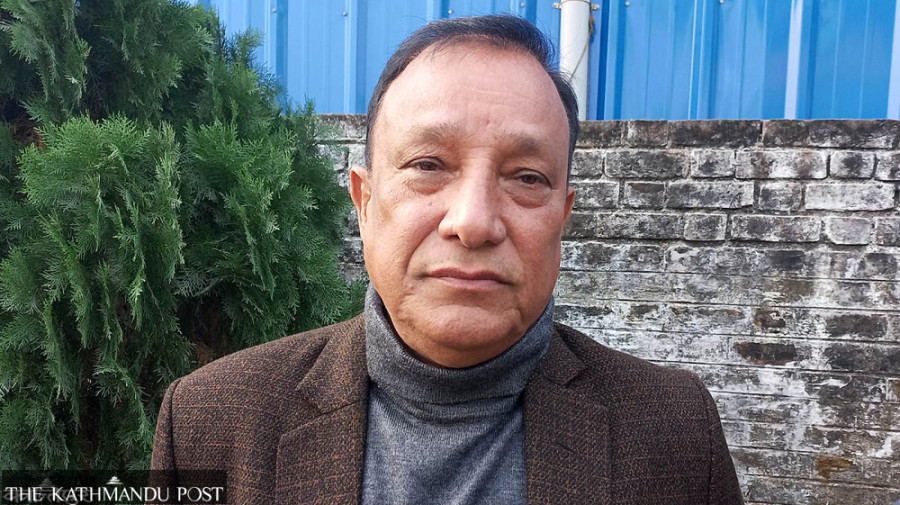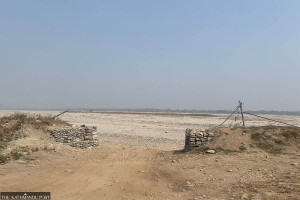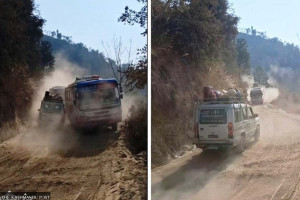Koshi Province
In a tactical move, Koshi chief minister inducts senior-most lawmaker as state minister
UML leaders say the deputy Speaker will continue the responsibility of presiding over provincial assembly and the party is open for discussions about the floor test.
Nishan Khatiwada
Gayananda Mandal, the senior-most lawmaker of the Koshi provincial assembly, has been appointed a state minister. The development is seen as a tactical move on the ruling coalition’s part, since the deadline of the vote of confidence of newly appointed chief minister Uddhav Thapa is only half a month away.
“Mandal took the oath of office and secrecy at 9 am on Wednesday as the state minister for Industry, Agriculture and Cooperatives,” Minister for Irrigation and Energy Pradip Kumar Sunwar, who is also the spokesperson for the provincial government, told the Post.
Mandal would have to chair the provincial assembly meeting had the deputy Speaker who was from CPN-UML resigned. Article 182 (5) of the Constitution states, “In case the election to the Speaker of Province and the Deputy Speaker of Province has not taken place, or in case both the positions have fallen vacant, the attending member who is by age the senior-most shall preside over the meeting of the Provincial Assembly.” Anyone chairing the meeting can’t participate in voting unless there is a tie.
Any lawmaker from the ruling coalition chairing the provincial assembly in place of Speaker would have brought complications in the floor test—since it leads to a tie between the ruling coalition and opposition, both of which have 46 lawmakers each.
According to government spokesperson Sunuwar, Mandal has been appointed the state minister as a representative of the Tarai-Madhesh community and because of his contribution as the senior-most leader. “Moreover, he has been inducted to avert further constitutional complications, if the deputy Speaker resigns.”
The second senior-most lawmaker in Koshi provincial assembly is from the UML and the third from Rastriya Prajatantra Party. Both parties are in opposition in Koshi, with 40 and six lawmakers, respectively.
The deputy Speaker Srijana Danuwar is presiding over the provincial assembly in the absence of the Speaker.
“The chief minister might have inducted Mandal as the state minister to be free from the constitutional provision and further complications in which our lawmaker may have to chair the provincial assembly, if the deputy Speaker resigns,” said Binod Rai, a Nepali Congress lawmaker. “Now the senior-most lawmakers are not from the ruling coalition.”
Nepali Congress Provincial Assembly party leader Thapa was appointed the Chief Minister of Koshi Province on August 1 following the resignation of Speaker Baburam Gautam. Speaker Gatuam resigned from the position earlier in the day—it ensured that the candidate from the alliance of parties including the Congress and CPN (Maoist Centre) will have majority votes (47 lawmakers in 93-strong provincial assembly) to stake claim for government formation.
Signatures of 29 lawmakers from Congress, 14 from the Maoist Centre, four from the CPN (Unified Socialist) and one from the Janata Samajbadi Party were submitted to the provincial head.
The ruling coalition provincial leaders had intense deliberations for days in Kathmandu about the ways for the new government formation in Koshi. They were also in talks with the Rastriya Prajatantra Party but it did not agree to come on board.
Constitutional experts have been criticising the misuse of the Speaker’s role in the government formation process after Thapa submitted the Speaker's signature to show the majority and form a government on July 7. The action was later challenged in the court which declared the government formation unconstitutional and removed Thapa from the post of chief minister.
Had the senior-most lawmaker from the Nepali Congress chaired the provincial assembly in Koshi, there would have been a conundrum on whether the leader who chairs the provincial assembly can vote during the vote of confidence or not, since the ruling coalition would be one lawmaker shy of majority.
UML leaders say the deputy Speaker will continue the responsibility of presiding over the provincial assembly and the party is open to discussion on the floor test.
“Whether the senior-most lawmaker is a minister or not does not matter now. The deputy Speaker who was from CPN-UML has said that she will take the responsibility of chairing the assembly as per the constitution,” said UML provincial assembly chief whip Rewati Raman Bhandari. “She is in an independent role. We will move forward in accordance with the constitution.”
Bhandari added that the UML is open to discussion with the chief minister if he seeks the vote of confidence from them.




 9.83°C Kathmandu
9.83°C Kathmandu












